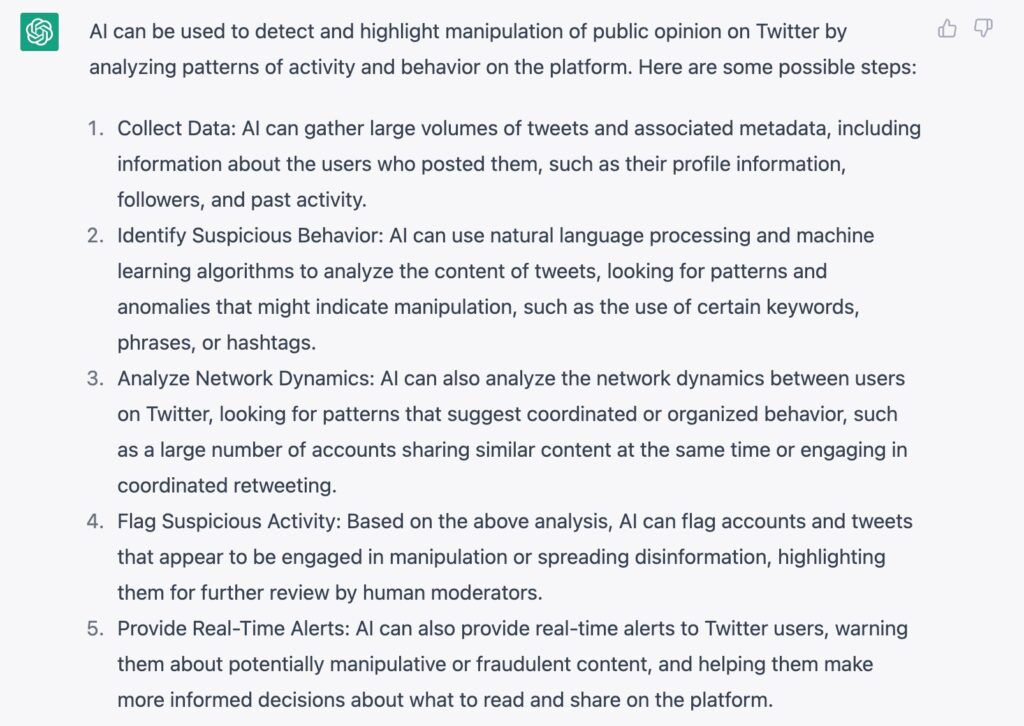Twitter boss Elon Musk is putting AI to a fresh use: over the weekend, the outspoken billionaire tweeted that he would use the technology “to detect & highlight manipulation of public opinion on this platform,” adding, “Let’s see what the psy ops cat drags in.”
Musk has voiced support for ex-Rolling Stone journalist Matt Taibbi, who has been one of several journalists documenting countless instances of censorship and suppression via the so-called Twitter Files.
In response to a tweet suggesting “Twitter will be the gold standard of discovering the truth about anything,” Musk replied “That’s the goal!”
A new era for Twitter?
Unsurprisingly, Musk’s tweet received quite a response having racked up 27 million views, 163.8k likes and 22.7k retweets by the time we went to press.
In the months ahead, we will use AI to detect & highlight manipulation of public opinion on this platform.
Let’s see what the psy ops cat drags in …
— Elon Musk (@elonmusk) March 18, 2023
While it remains to be seen whether the San Francisco-based company can achieve such lofty ambitions, the idea of leveraging AI to address manipulation of public opinion is an interesting concept.
To get a sense of how this might work, we turned to AI-powered ChatGPT, which suggested AI could “analyze patterns of activity and behavior” to look for “anomalies that might indicate manipulation, such as the use of certain keywords, phrases, or hashtags.”
ChatGPT went on to suggest that AI could “flag accounts and tweets that appear to be engaged in manipulation or spreading disinformation, highlighting them for further review by human moderators.”

The question, of course, becomes: who gets to decide what is disinformation? During the pandemic, Twitter’s content moderation efforts kicked into overdrive as numerous accounts were banned after being deemed to have spread misinformation – though Musk rolled back the company’s Covid-19 misinformation policy back in November.
Twitter’s naughty step
Those who saw their accounts banned included top cardiologist Dr. Peter McCullough and Dr. Robert Malone, who was heavily involved in early mRNA research. (Both had their accounts reinstated in December.) Stanford’s Dr. Jay Bhattacharya, a signatory of the Great Barrington Declaration that opposed lockdowns, was also placed on a Trends Blacklist that prevented his tweets from trending, while Rep. Marjorie Taylor Greene (R-Ga.) saw her account suspended for casting doubt on the efficacy of vaccines.
In total, Twitter suspended over 11,000 accounts and purged over 100,000 pieces of content for violating its policy. While many cheered the suppression of what they perceived as misinformation – even if it came from doctors or scientific experts – others were uncomfortable about a top-down policy that saw Twitter lose its status as a free, fair, and open public forum for discussion and debate.
Also Read: Musk Wants a Twitter for Everything, Pushes Payments Button
Twitter Files reveal extent of censorship
The Twitter Files have laid bare the extent of the censorship Musk says he wants to combat, including efforts by both the Trump and Biden administrations to pressure company executives to censor information that was “true but inconvenient” during the pandemic.
Early in the crisis, the Trump administration sat down with executives at Twitter, as well as those from other tech giants like Google and Facebook, to solicit “help to combat misinformation” concerning “runs on grocery stores… that could stoke panic buying and behaviours.”
Journalist David Zweig, who has disseminated the Twitter Files alongside Taibbi, Michael Shellenberger, Leighton Woodhouse, Abigail Shrier, and Lee Fang, accused legacy media of “largely operating as a messaging platform for our public health institutions” who “operated in near lockstep, in part by purging internal dissidents and discrediting outside experts.”
Last week, Elon Musk revealed that Twitter would open source all code used to recommend tweets on March 31, calling the algorithm “overly complex and not fully understood internally.”









 and then
and then